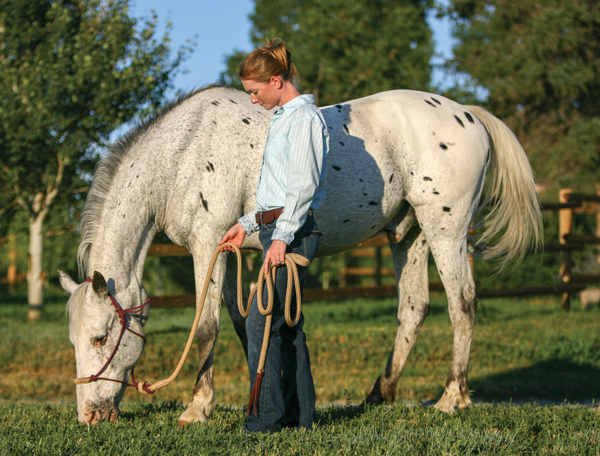
Being herbivores, horses rely on eating large amounts of fibrous vegetation throughout the day to keep their digestive systems healthy and their body weight on target. The mechanical means by which your horse tears and grinds hay, grass, and any grain that you give him heavily dictates how much he can consume and how well it is digested. It’s no small wonder that when a senior horse’s teeth start to show their age, so does the rest of the horse. The following is a look at equine dentition in more detail and how to keep senior horses’ teeth as healthy as we can with proper senior horse dental care.
Physiology
grazing.
If you look at an X-ray of a young horse’s head, you’ll see enormously long molars embedded in the jaw. These teeth will slowly continue to push through the gums during the horse’s entire life. A senior horse’s jaw will have hardly any molars left below the gum. This makes them more prone to losing teeth, which becomes a problem as the molar opposite the missing tooth is likely to overgrow, resulting in uneven wear or the formation of sharp points on the remaining tooth.
A common expression for an older horse with missing or severely worn teeth is that he’s “run out of tooth.” Missing teeth and the gaps they create in the mouth can also impinge on a horse’s natural jaw movement, resulting in pain and inefficient chewing.
Additionally, a horse’s upper jaw is wider than the lower jaw. If you watch a horse chew, you’ll notice his mouth moves side to side, not up and down, to thoroughly grind down fibrous plant material.
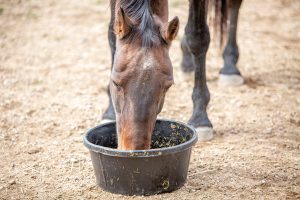
Wear and Tear
Over the course of a horse’s life, uneven tooth wear can gradually cause problems. In some cases, this produces a condition called wave mouth, where some molars are taller than others, creating what looks like a rollercoaster on the grinding surface of the horse’s back teeth.
More typically, uneven wear creates sharp points on the edges of some molars. Although these points can and do develop in younger horses’ mouths, they are seen more frequently in our older equines, usually because mild dental issues have been missed or ignored and are compounded as the horse ages.
As you might imagine, a sharp point in the mouth can be extremely painful, with the end result producing a red ulcer either on the side of the tongue or along the inside of the cheek.
These sores can make eating difficult. In younger horses, the molars are tightly
packed together with no room in between. This means they don’t typically get cavities or gum disease like humans do. However, as a horse ages and his teeth are progressively worn, gaps are created between the teeth. This allows feed to accumulate and sometimes get impacted between molars.
This can irritate and inflame the gums and even result in infections, leading to an abscessed tooth. If not addressed, this infection can progress into the sinus or the jaw. Occasionally, older equines may need an infected tooth pulled or, although rare, a root canal, depending on the degree of diseased tissue.
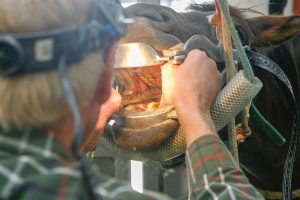
Problems to Look For
One of the classic and most common signs of poor dentition in older horses is “quidding.” This is a term used when clumps of partly chewed food drop from a horse’s mouth while he’s eating.
Quidding occurs because of mouth pain; as the horse tries to avoid an ulcerated lesion, halfchewed food inevitably drops out. Sometimes you may also see a horse drool or play with his food or water instead of gobbling it down, although these can be signs of other problems as well, such as abdominal pain or choke.
Inefficient eating will eventually catch up with a horse in the form of weight loss, especially in a senior that may have other health issues. Compounded with metabolism changes and loss of muscle tone, bad teeth most commonly cause that stereotypical image of a thin senior horse.
Bad breath, called halitosis, can also be a sign of dental issues in a horse. One relatively new dental disease identified in older horses is called equine odontoclastic tooth resorption and hypercementosis (aka EOTRH).
EOTRH is an extremely painful condition seen in some older horses. While the cause is not yet understood, EOTRH occurs when the body begins to reabsorb the incisors and sometimes the canines. This causes the horse to drool, have bad breath, and sometimes demonstrate “smiling” behavior when the lips are curled back to expose the incisors.
While there is no cure for EOTRH, removing the affected incisors helps alleviate the pain of this senior horse dental condition.
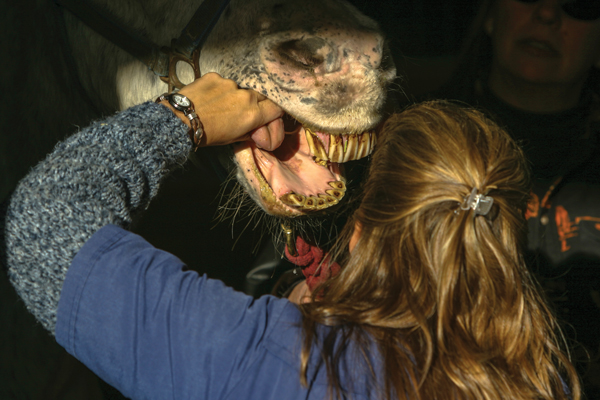
Dental Exams
Regular dental checks should be part of your horse’s routine health program. “Floating” is the term used to describe the act of rasping a horse’s molars to maintain an even grinding surface with the opposing tooth, and helps prevent the formation of sharp points in the mouth. Floating is not meant to smooth out the molar’s grinding surface: its bumpy ridges on the top are needed for proper grinding.
When younger, yearly dental checks and minor floating are usually enough to keep a horse’s mouth in top shape unless underlying malocclusion issues are found. As a horse ages into his 20s, floating every six months may be advised by your vet, depending on issues found and signs your horse may be showing.
Mouths with lots of problems can’t be all fixed in one visit. If large points are found on an exam, a few visits over a series of months may be needed as large chunks of tooth should not be rasped down all at once. Excessive floating can cause heat damage to the tooth root, so it must be done in short bursts.
Floating can be done either manually with hand floats, which are long rasps pulled back and forth over a horse’s molars by hand, or mechanically by a tool called a power float. A thorough floating is best done with the horse under light sedation. For this reason, it’s recommended to have a veterinarian do the floating.
Since it can be hard to grasp how large a horse’s molars are and how they grind
together, take a look inside your horse’s mouth during his next senior hose dental exam. If your veterinarian uses a speculum to hold the mouth open, ask if you can place a hand in your horse’s mouth to feel the surface of his teeth.
If your horse has some points, feel how sharp they are—you might be surprised. And once you’ve seen a large, painful ulcer on a cheek or tongue, you’ll never forget it.
After floating, keep your horse quiet until the sedation wears off. His mouth may be a bit tender immediately after the procedure, depending on how much work was required. Give him the day off of riding, but unless otherwise directed by your veterinarian, he should be ready to return to work the following day. Typically no changes in diet are needed.
Reaching senior status is a sign that your horse’s teeth need closer inspection. However, with regular checks, his mouth can be kept in its best condition no matter his age.
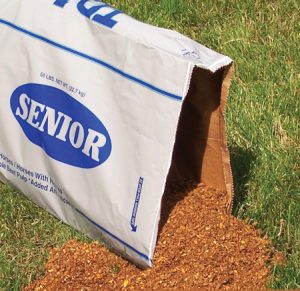 Feeding the Senior HorseAs your beloved partner ages, his nutrition needs change as tooth growth slows or stops. Eating slower, quidding, weight or muscle loss, and even choke may be caused by dental issues or discomfort. If your horse starts showing signs of dental problems, consult your veterinarian and consider making adjustments to your feeding program. ■ Built-In Forage: Horses need at least 1.5 to 2 percent of their body weight in forage (hay or pasture) daily to maintain proper gut health. As horses age and lose the ability to effectively chew and salivate, eating and digesting long-stemmed forage becomes more difficult. Complete feeds are formulated with high-quality fiber, and they are designed to supply all or part of the daily forage a horse needs in an easy-to-chew and digest pellet. Alternatively, you can add chopped hay or other pelleted forages to your horse’s diet. ■ Palatability: Senior horses can become finicky eaters, making it difficult for you to maintain their weight. When choosing a senior feed, look for a highly palatable feed, but watch out for feeds with excessive sugar and starch content. Consider a feed that includes a blend of molasses and oil to improve palatability and boost fat content (compared to straight cane molasses, which is higher in sugar). A molasses/oil blend can help entice a picky horse to keep eating while keeping the sugar and starch content at the right levels for horses with carbohydrate sensitivities. ■ Easily Digestible: Saliva production can start to decrease in aging horses. Saliva helps horses swallow and digest hay and feed. A highly digestible and easy-to-chew senior feed can help counteract the effects of reduced saliva production. Look for a feed with high-quality fiber sources such as beet pulp and premium hay to help senior horses maintain body condition and normal digestive function. ■ Feed Manufacturing: Feed manufacturing is also important to consider when choosing a senior feed. Look for a pellet that’s tested to be easy for horses to chew and digest, plus easy to soak. Horses with severe dental issues or missing teeth can benefit from a mash made with a soaked senior feed and warm water. A mash can help horses chew and swallow while still providing all the necessary fiber, nutrients and calories needed to maintain weight and stay healthy. — Kelly Vineyard, M.S., Ph.D., Senior Equine Nutritionist, Purina Animal Nutrition |
This article about senior dental care originally appeared in the October 2019 issue of Horse Illustrated magazine. Click here to subscribe!





